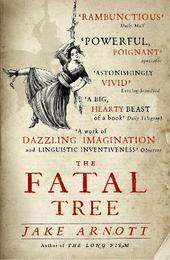
|
The Fatal Tree
Paperback / softback
Main Details
| Title |
The Fatal Tree
|
| Authors and Contributors |
By (author) Jake Arnott
|
| Physical Properties |
| Format:Paperback / softback | | Pages:352 | | Dimensions(mm): Height 196,Width 128 |
|
| Category/Genre | Historical fiction |
|---|
| ISBN/Barcode |
9781473637764
|
| Classifications | Dewey:823.92 |
|---|
| Audience | |
|---|
|
Publishing Details |
| Publisher |
Hodder & Stoughton
|
| Imprint |
Sceptre
|
| Publication Date |
7 September 2017 |
| Publication Country |
United Kingdom
|
Description
Newgate Gaol, 1726. An anonymous writer sets down the words of Edgworth Bess as she confides the adventures and misfortunes that led her all too soon to the judgement of London: Cruelly deceived, Bess is cast out onto the streets of the wicked city - and by nightfall her ruin is already certain. What matters now is her survival of it. In that dangerous underworld known in thieves' cant as Romeville, she will learn new tricks and trades. And all begins with her fateful meeting, that very first night, with the corrupt thief-taker general Jonathan Wild. But it is the infamous gaol-breaker, Jack Sheppard, who will lay Romeville at her feet . . . Drawing on the true story that mesmerised eighteenth-century society, the acclaimed author of THE LONG FIRM delivers a tour de force: a riveting, artful tale of crime and rough justice, love and betrayal. Rich in the street slang of the era, it vividly conjures up a murky world of illicit dens and molly-houses; a world where life was lived on the edge, in the shadow of that fatal tree - the gallows. Includes a glossary.
Author Biography
Jake Arnott was born in 1961, and lives in London. He is the author of THE LONG FIRM, published by Sceptre in 1999 and subsequently made into an acclaimed BBC TV series. His second novel, HE KILLS COPPERS, was also made into a series by Channel 4. He has since published the novels TRUECRIME, JOHNNY COME HOME, THE DEVIL'S PAINTBRUSH and THE HOUSE OF RUMOUR.
ReviewsA work of dazzling imagination and linguistic inventiveness - Observer A rambunctious narrative of venery, theft, death and a devil-may-care braggadocio, its doomed love story undercuts and counterpoints the swagger with a touching melancholy. Bess, Jack and Jonathan were real people and this confident linguistic pastiche reimagines them with infectious energy. - Daily Mail Jake Arnott, who is probably best known for excellent novels such as The Long Firm about London gangsters in the 1960s, has done much more than update the work of his 18th-century predecessors. Unlike them, he shows the citizens of Romeville as people, not as folk heroes or bogeymen . . . Arnott explores what poor Bess calls 'the felony of love', a crime that is not on the statute book. The result is powerful, poignant and readable. - Spectator Jack's awkward courtship of Bess is a highlight of the book - Arnott's best so far - and genuinely moving . . . an astonishingly vivid act of ventriloquy that breathes life into infamous corpses - Evening Standard The narrative is woven through with vividly portrayed characters, from Bess and Jack themselves to the superbly realised, wonderfully named Punk Alice and Poll Maggot, the transvestite Princess Seraphina; and the mixed-race heavy, Blueskin. Arnott delights too in the secret language of thieves - Observer Bawdy and rich with vivid evocations of the past . . . The Fatal Tree is Arnott on beguiling form, with the libidinous Bess a wonderfully multifaceted character. Who would have thought that a cult crime writer would become the Daniel Defoe of our day? - i News A seductive, cunning tale of crime, punishment and love among the thieves, prostitutes and charlatans of 1720's London. Laced with vibrant detail and deliciously evocative period language, Arnott's atmospheric novel is a Hogarth print come to life . . . With a cast of delightfully convincing characters and lines that are reminiscent of Dickens or Wilde, Arnott has triumphantly breathed life into history - and the result is glorious. - Attitude A dazzling mix of fact and fiction . . . the Hogarthian tale of a Harlot's Progress - Sunday Herald
|